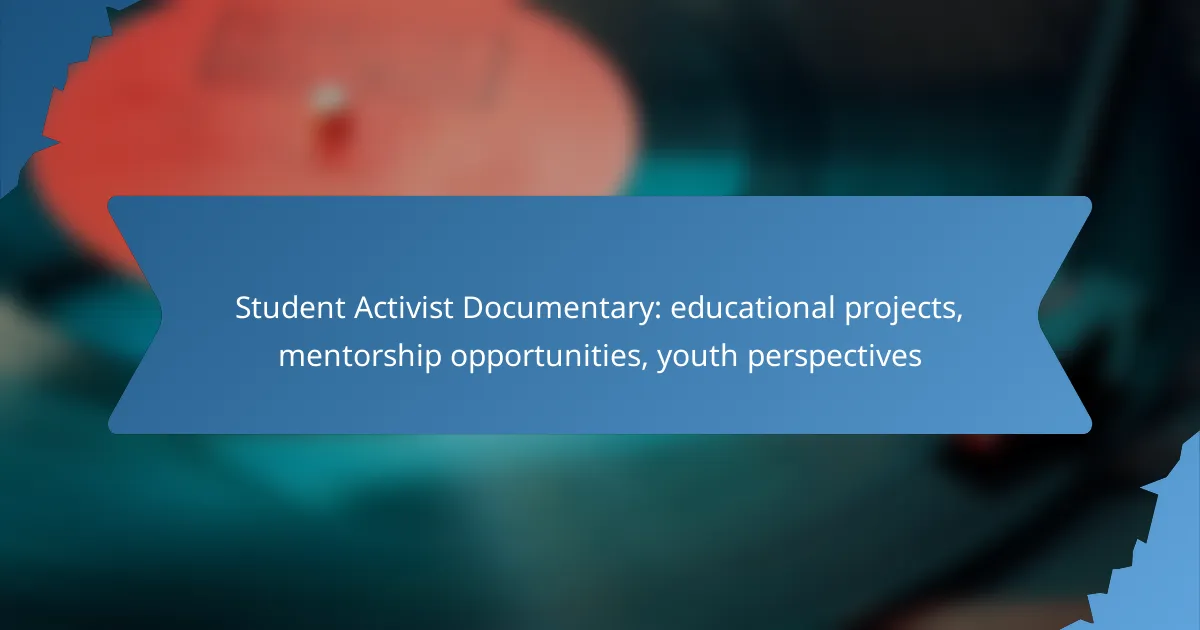This documentary explores the vibrant world of student activism in the UK, highlighting educational projects that empower young individuals to drive social change. Through mentorship opportunities and community engagement, students gain valuable skills and insights, amplifying their voices on pressing issues such as social justice and climate action. By showcasing youth perspectives, the film illustrates how these passionate activists challenge norms and shape the future of activism.
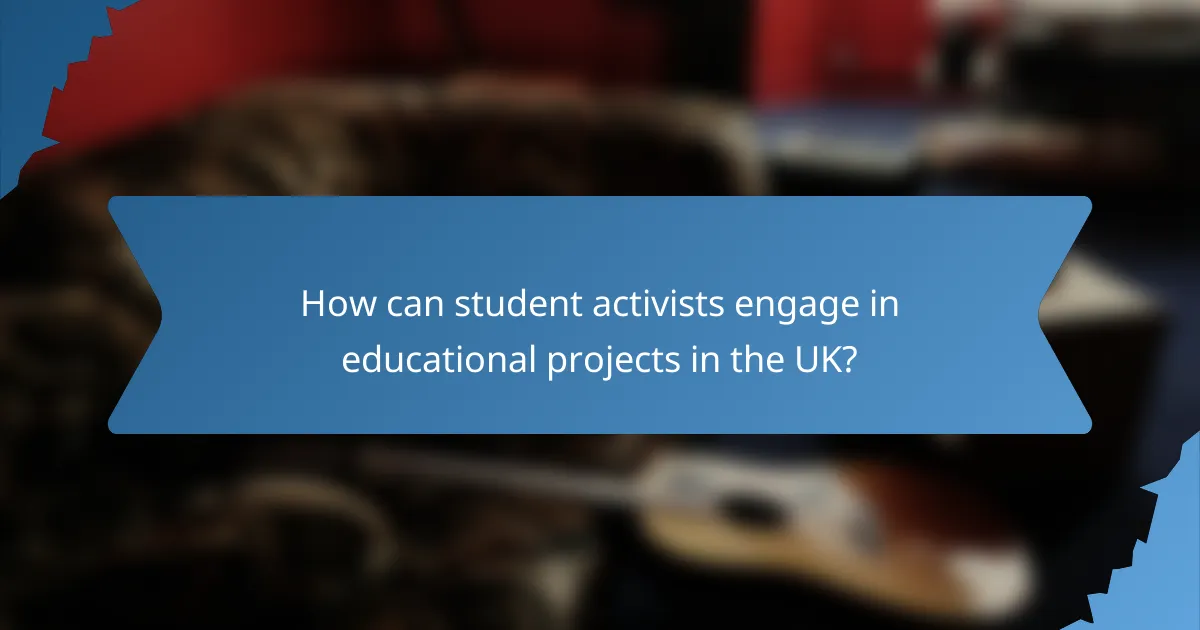
How can student activists engage in educational projects in the UK?
Student activists in the UK can engage in educational projects by collaborating with local communities, schools, and universities to promote social change and awareness. These initiatives often focus on youth perspectives, providing mentorship opportunities and hands-on experiences that empower students to take action.
Community-based learning initiatives
Community-based learning initiatives allow student activists to work directly with local organizations to address pressing social issues. These projects often involve workshops, discussions, and collaborative events that encourage community participation and awareness.
For example, students might partner with local charities to create awareness campaigns on topics like mental health or environmental sustainability. Engaging with community members helps activists understand diverse perspectives and fosters a sense of shared responsibility.
Partnerships with local schools
Forming partnerships with local schools can enhance educational projects by providing a platform for student activists to share their knowledge and experiences. These collaborations can take the form of guest lectures, mentorship programs, or co-hosted events that focus on relevant social issues.
Activists should consider developing age-appropriate materials and activities that resonate with younger students. This approach not only educates but also inspires the next generation to become involved in activism.
University-led outreach programs
University-led outreach programs offer structured opportunities for student activists to engage with broader communities. These programs often include training sessions, workshops, and volunteer opportunities that connect students with local organizations and initiatives.
Students can benefit from mentorship from university faculty and experienced activists, gaining insights into effective advocacy strategies. Participating in these programs can also enhance their academic experience and provide valuable networking opportunities within the activist community.
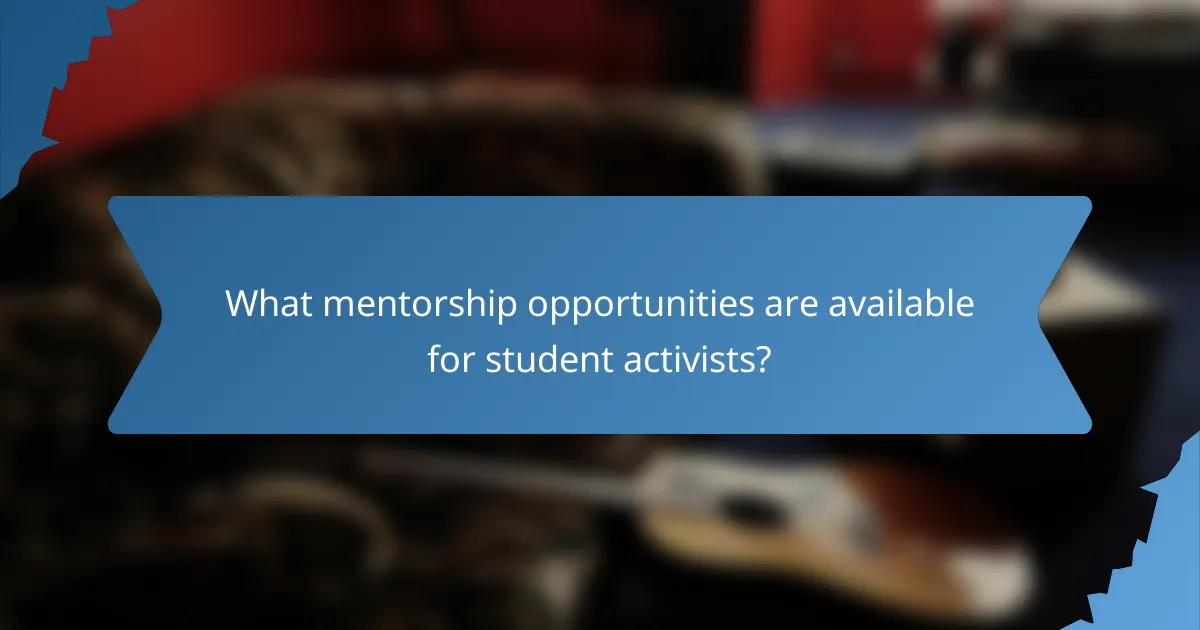
What mentorship opportunities are available for student activists?
Student activists can access various mentorship opportunities that help them develop skills, gain insights, and expand their networks. These programs often connect young individuals with experienced mentors who can provide guidance and support in their activism efforts.
Nonprofit mentorship programs
Many nonprofit organizations offer mentorship programs specifically designed for student activists. These programs typically pair students with seasoned activists who can share their experiences and strategies. Participants often engage in workshops, networking events, and one-on-one sessions to enhance their advocacy skills.
For example, organizations like the Youth Activism Project provide structured mentorship that includes training in campaign planning and community organizing. Students can benefit from the resources and connections these nonprofits offer, often at no cost.
University mentorship schemes
Universities frequently have mentorship schemes that support student activists through faculty and alumni connections. These programs may include formal mentorship arrangements or informal networking opportunities during events and workshops. Students can gain valuable insights into navigating activism within academic settings.
Some universities also have dedicated centers for social justice that facilitate mentorship, offering resources tailored to student activists’ needs. Engaging with these schemes can help students align their activism with academic pursuits, enhancing both their educational and activist journeys.
Peer mentoring networks
Peer mentoring networks allow student activists to connect with fellow students who share similar interests and goals. These networks foster collaboration and support, enabling students to learn from each other’s experiences and challenges. They often organize group discussions, workshops, and collaborative projects.
For instance, student-led organizations may create mentorship circles where participants can share resources, brainstorm ideas, and provide feedback on each other’s initiatives. This peer support can be invaluable in building confidence and resilience in activism.
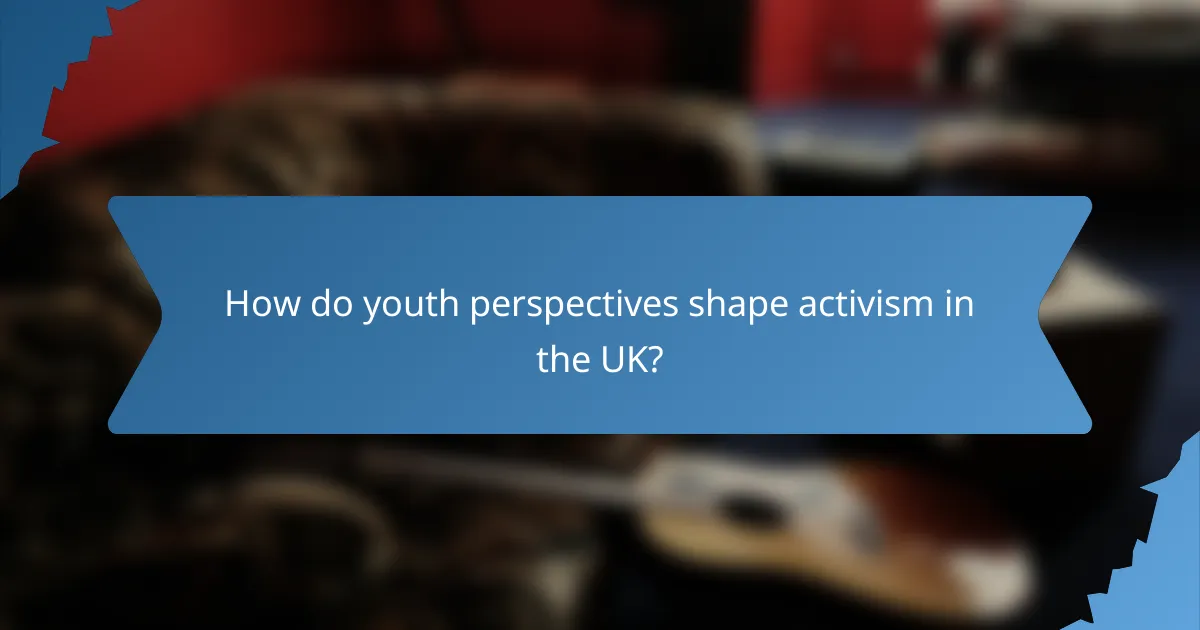
How do youth perspectives shape activism in the UK?
Youth perspectives significantly influence activism in the UK by bringing fresh ideas and urgent issues to the forefront. Young activists often challenge traditional norms and advocate for social justice, climate action, and equality, making their voices crucial in shaping public discourse and policy.
Impact of youth-led movements
Youth-led movements have transformed the landscape of activism in the UK by mobilizing large groups around pressing social issues. These movements often prioritize inclusivity and grassroots participation, empowering young people to take ownership of their causes. As a result, they can drive significant change, influencing public opinion and policy decisions.
For instance, movements like Fridays for Future have galvanized thousands of young people to demand urgent action on climate change, showcasing the power of youth voices in shaping environmental policies.
Case studies of successful campaigns
Several successful campaigns led by youth activists in the UK highlight the effectiveness of their perspectives. The Black Lives Matter movement gained momentum through the passionate involvement of young people, leading to widespread protests and discussions about systemic racism and police reform.
Another example is the campaign for mental health awareness, where young activists have successfully lobbied for improved mental health services in schools. Their efforts have resulted in increased funding and support for mental health initiatives across the UK.
Role of social media in youth activism
Social media plays a pivotal role in amplifying youth activism in the UK by providing platforms for sharing ideas and mobilizing supporters. It allows young activists to reach a wider audience quickly, facilitating real-time engagement and collaboration.
Platforms like Instagram and Twitter are particularly effective for organizing events, sharing personal stories, and raising awareness about various causes. However, it is essential for activists to navigate the challenges of misinformation and online harassment to maintain the integrity of their movements.
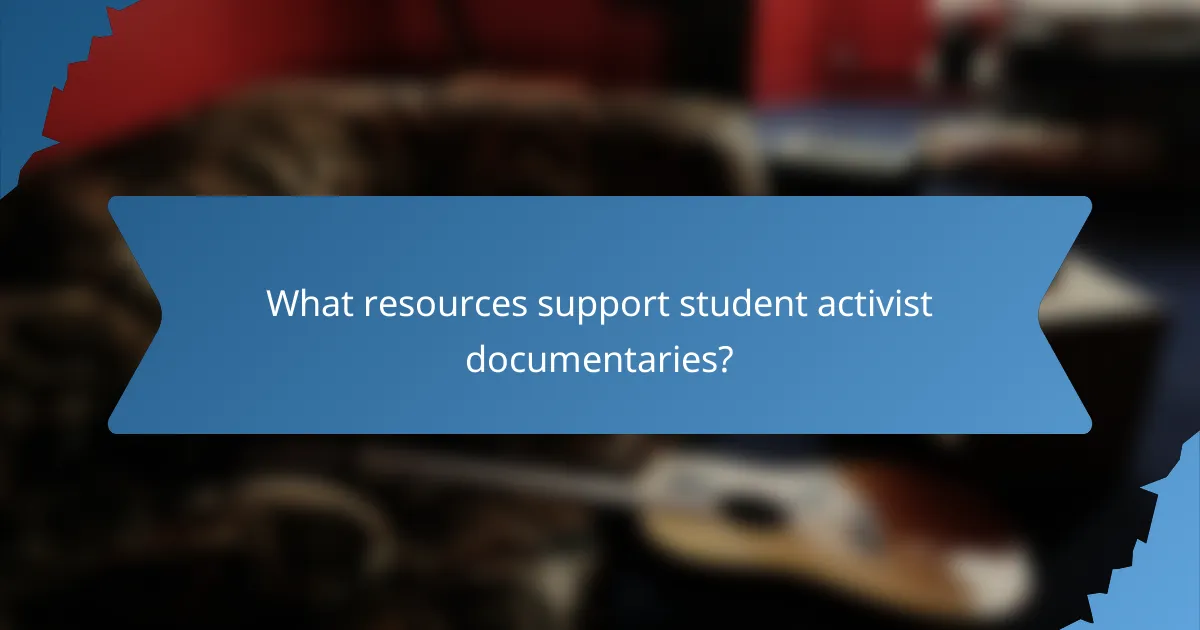
What resources support student activist documentaries?
Student activist documentaries can benefit from various resources, including funding, partnerships with educational institutions, and access to archival materials. These resources enhance the production quality and outreach of documentaries focused on youth perspectives and activism.
Funding opportunities for filmmakers
Filmmakers can explore multiple funding sources to support student activist documentaries. Grants from organizations dedicated to social change, such as the Sundance Institute or the National Endowment for the Arts, often prioritize projects that highlight youth activism.
Additionally, crowdfunding platforms like Kickstarter or Indiegogo allow filmmakers to raise funds directly from supporters. Setting a realistic funding goal and offering attractive rewards can significantly increase the chances of success.
Collaborations with educational institutions
Partnering with schools, colleges, or universities can provide valuable resources for student activist documentaries. Educational institutions often have access to equipment, facilities, and expertise that can enhance production quality.
Moreover, these collaborations can facilitate mentorship opportunities, connecting student filmmakers with experienced professionals in the industry. This guidance can be crucial in navigating the complexities of documentary filmmaking.
Access to archival materials
Archival materials can enrich student activist documentaries by providing historical context and supporting narratives. Filmmakers should seek partnerships with libraries, museums, or archives that house relevant collections.
Many institutions offer digital access to archival footage, photographs, and documents, which can be invaluable for storytelling. Understanding copyright regulations and obtaining necessary permissions is essential when using these materials in documentaries.
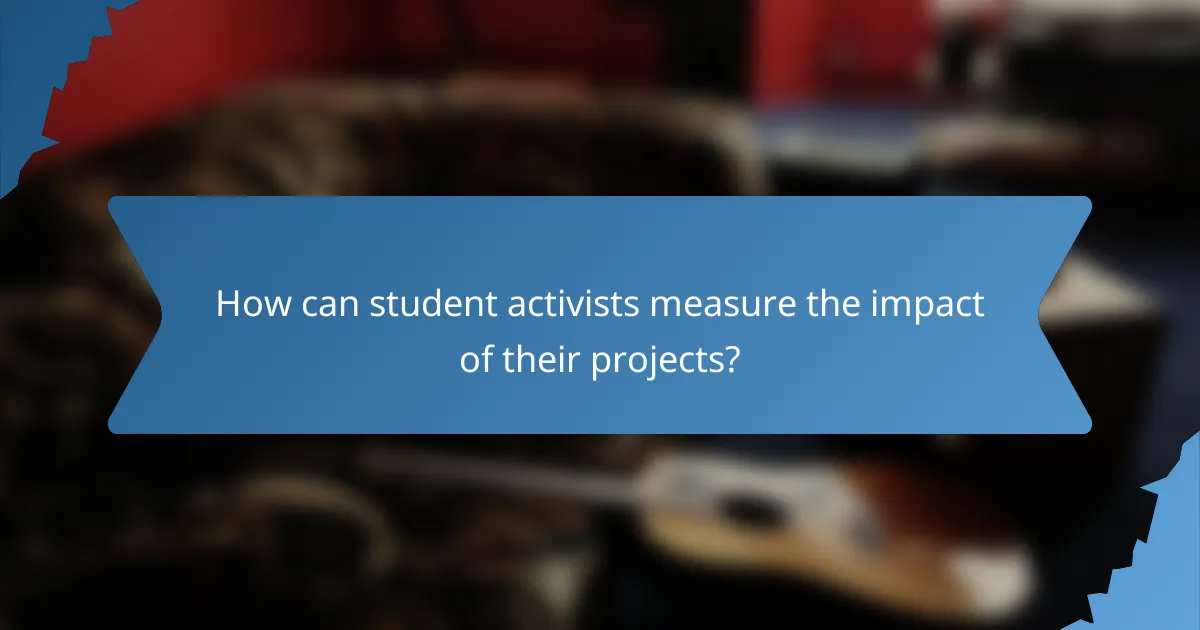
How can student activists measure the impact of their projects?
Student activists can measure the impact of their projects through various methods that assess both qualitative and quantitative outcomes. Effective measurement often involves gathering feedback, analyzing case studies, and evaluating community engagement to understand the project’s effectiveness and areas for improvement.
Surveys and feedback mechanisms
Surveys are a straightforward way for student activists to gather direct feedback from participants and the community. By designing questionnaires that focus on specific project goals, activists can capture insights on participant satisfaction and perceived impact. Aim for a response rate of at least 30% to ensure the data is representative.
Utilizing online tools like Google Forms or SurveyMonkey can streamline the process. Consider including open-ended questions for richer qualitative data, allowing respondents to share their thoughts in their own words.
Case study analysis
Conducting case studies involves a detailed examination of specific instances where the project was implemented. This method allows activists to explore the context, challenges, and successes of their initiatives. A well-documented case study can highlight best practices and lessons learned, which can be shared with peers and stakeholders.
When analyzing case studies, focus on key metrics such as participant engagement, outcomes achieved, and any shifts in community attitudes. This qualitative approach complements quantitative data, providing a fuller picture of the project’s impact.
Community engagement metrics
Community engagement metrics help assess how well a project connects with its target audience. Key indicators include attendance at events, social media interactions, and volunteer participation rates. Tracking these metrics can reveal trends and inform future project planning.
For instance, if a project aims to increase youth involvement in local governance, measuring the number of young people attending town hall meetings before and after the project can provide clear insights into its effectiveness. Regularly reviewing these metrics helps ensure that activists remain responsive to community needs and can adjust their strategies accordingly.
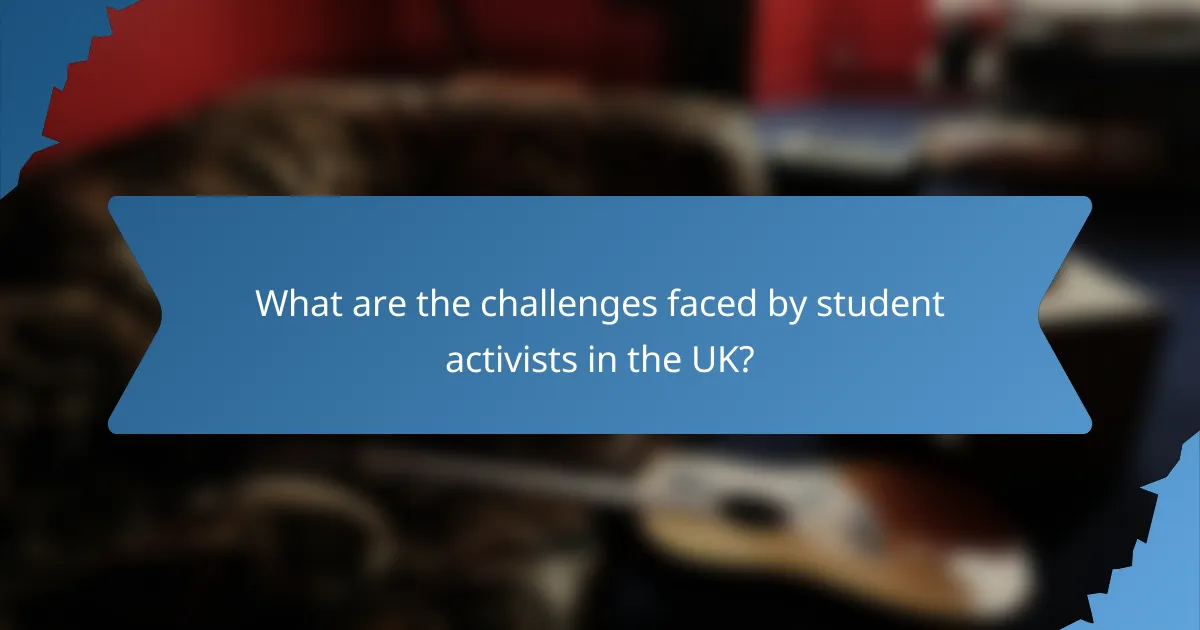
What are the challenges faced by student activists in the UK?
Student activists in the UK encounter several significant challenges that can hinder their efforts. These include funding limitations, institutional resistance, and the difficulty of balancing activism with academic responsibilities.
Funding limitations
Many student activist groups struggle with securing adequate funding for their initiatives. Limited budgets can restrict the scope of projects, making it difficult to organize events, campaigns, or outreach programs effectively.
To navigate funding challenges, activists often rely on small grants, crowdfunding, or university support. However, these sources may not always cover the full costs, leading to compromises in project quality or reach.
Institutional resistance
Student activists frequently face resistance from educational institutions that may view their activities as disruptive. This can manifest as administrative hurdles, lack of support, or even pushback against certain causes.
Building alliances with sympathetic faculty or student organizations can help mitigate this resistance. Activists should also familiarize themselves with university policies to effectively advocate for their rights and initiatives.
Balancing activism with academic responsibilities
Juggling activism and academic commitments is a common struggle for student activists. The demands of coursework, exams, and extracurricular activities can leave little time for advocacy work.
To manage this balance, students can prioritize their time, set realistic goals for their activism, and seek support from peers. Creating a flexible schedule that accommodates both academic and activist pursuits can lead to more sustainable involvement.
